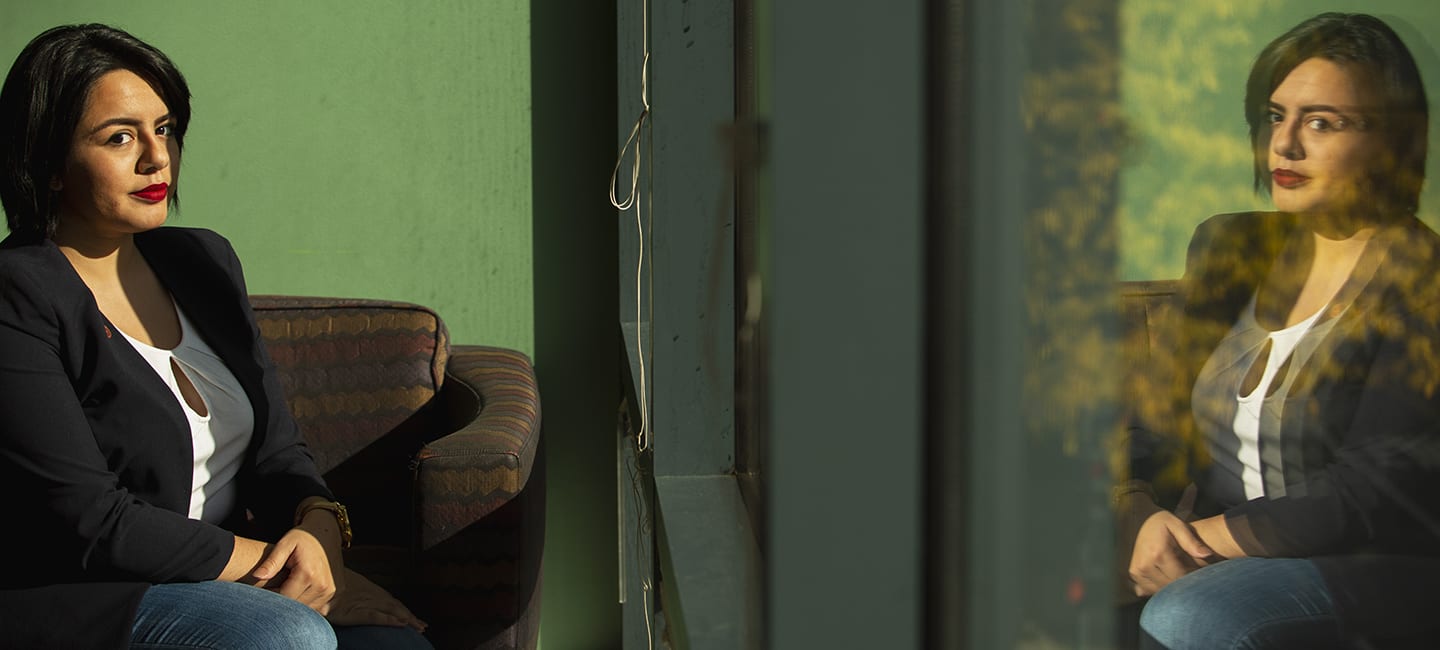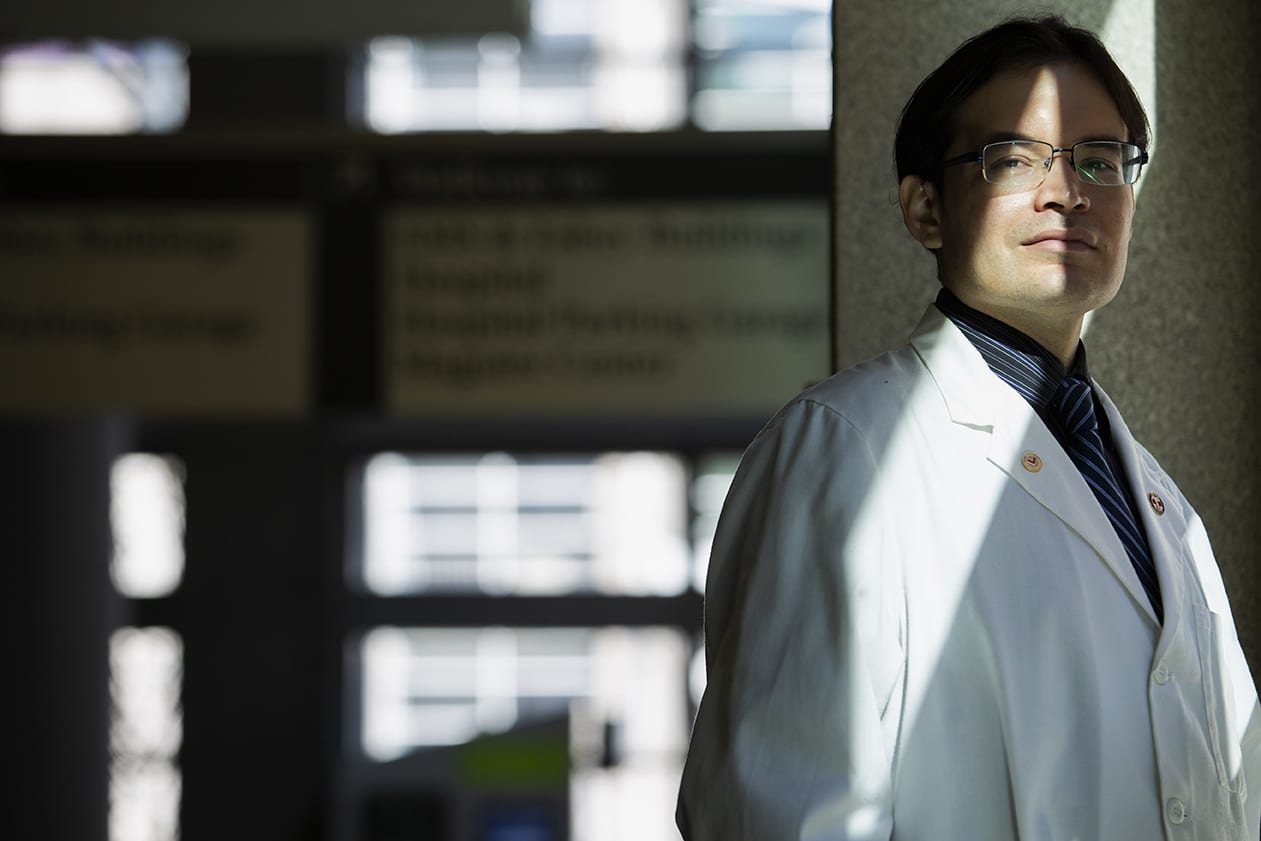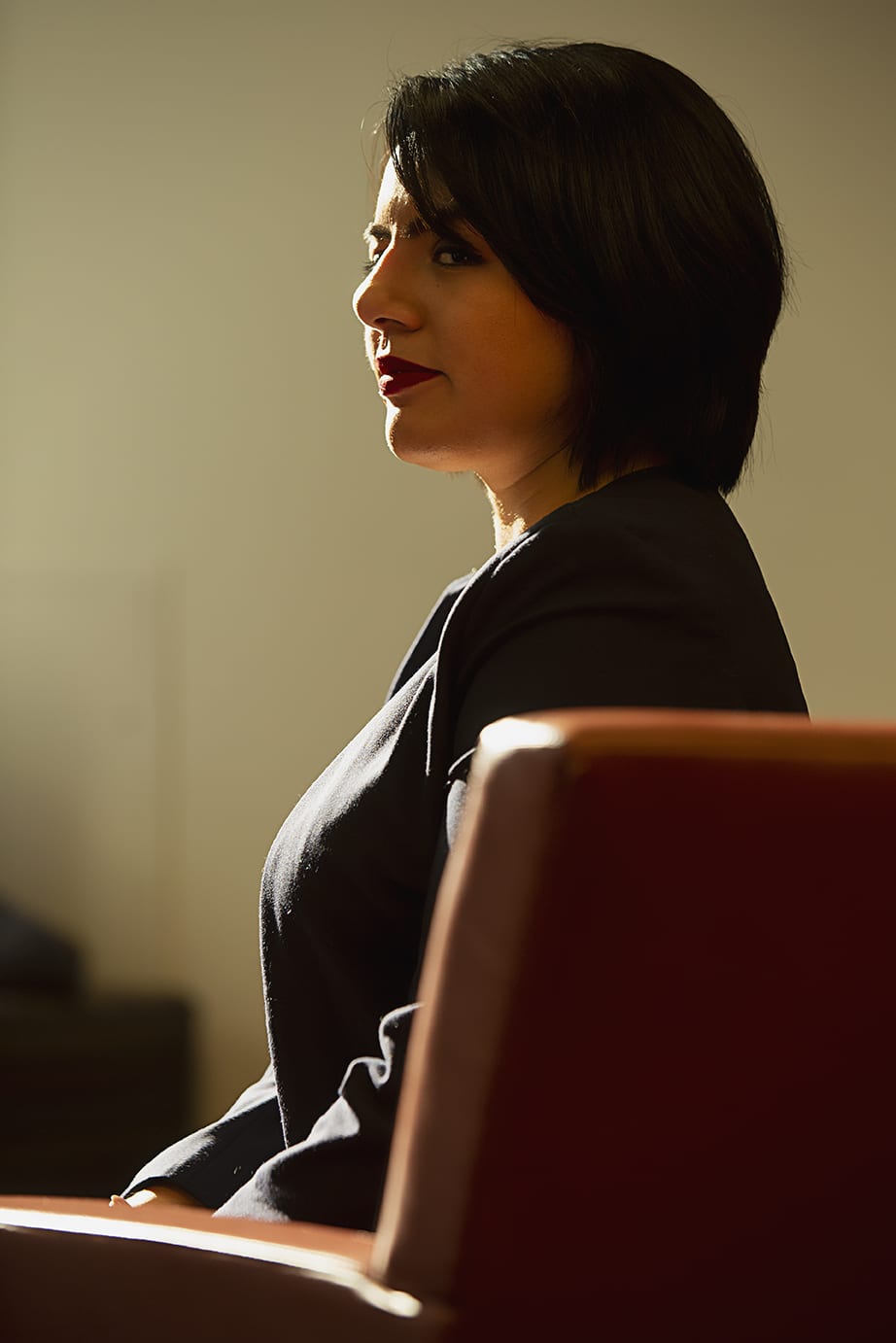 Photo by Michelle Kanaar
Photo by Michelle Kanaar Two Chicago DACA recipients tell Borderless just what’s at stake with the case challenging temporary relief for young immigrants
Above: Fernanda Herrera Vera pictured at Loyola University’s School of Law on Nov. 7, 2019. Photo by Michelle Kanaar.
The Supreme Court will hear arguments today in three cases challenging whether the Trump administration acted properly in its decision to close the Deferred Action for Childhood Arrivals (DACA) program for “Dreamers” — an Obama-era program that has provided relief for some undocumented immigrants who were brought to the U.S. as children to live. This program has allowed some 700,000 young people to go to school and work without fear of deportation. A Supreme Court ruling on the DACA program is expected next spring during the 2020 presidential election.
The DACA initiative was launched in 2012 and allows children of people with undocumented status to stay in the United States if they arrived under the age of 16 and by the year 2007. Advocates at the Illinois Coalition for Immigrant and Refugee Rights, which is participating in a DACA supporters march from New York to D.C. to bring attention to this critical decision, hopes that the Supreme Court lands “on the right side of history” in their decision. “We also recognize that Congress ultimately must create a pathway to citizenship for DACA recipients, their families and all undocumented people living and working in the U.S.,” said Cara Smith, ICIRR director of public affairs, of Tuesday’s hearing of arguments.
Among the audience of observers at the Supreme Court today will be Cesar Montelongo Hernandez and Fernanda Herrera Vera, two DACA status graduate students at Loyola University in Chicago who have been waiting years for today. Borderless Magazine’s Sarah Conway spoke with them about their journeys to acquiring DACA status and why they are attending the SCOTUS arguments today in Washington, D.C.
Cesar Montelongo Hernandez pictured at Loyola University’s Stritch School of Medicine on Nov. 7, 2019. Photo by Michelle Kanaar.
Cesar Montelongo Hernandez, 30, Loyola University Stritch School of Medicine MD-PhD candidate 2022
From as young as I could remember I wanted to heal people. I was 7 years old when I saw my dad, this strong man just stuck in bed, unable to move. It made me feel insecure at the time and it fueled an obsession of wanting to keep my family from going through pain. When I was a child, I didn’t know what a nurse or a doctor was but I just had a sense that I wanted to keep others from getting sick. In high school, I realized that if I wanted to become that person, I would have to go to medical school. However, I was undocumented and there were no pathways at that time for a student like me to go to medical school.
My whole journey until today started with that decision of pursuing medical school while knowing that my probability of getting there was zero. But you build toward something knowing that because of your status, you can still end up with nothing after years of hard work.
The first big hurdle is that you can’t pay for it. Undocumented students have always struggled with higher education funding because either you have to have the money to pay for school upfront, qualify for a scholarship or get student loans, and we weren’t allowed to get federal loans. It’s because in the mid-1990s the Clinton administration passed multiple laws that prohibited undocumented people from accessing public benefits, one such benefit being federal financial aid. This made medical school impossible for undocumented students because medical school is financed through federal loans.
The second big hurdle is that since no one undocumented had ever tried to go to medical school, there was no infrastructure for us to apply. I remember filling out forms and there was no option to even choose my status on forms: it would be a student or international student but nothing for a student without immigration status.
Before I was accepted into medical school, I felt that sense of stagnation because of my status. Every day it felt like I was sinking more and more. Undocumented students are aware of our mortality. We have to live with this physical threat daily that the ones that we love and even our own physical safety could be taken away at any moment. I think that makes us more sensitive to this sense of dread to what it means to be human. We just see this darkness that keeps extending onward and we don’t see a way out of it.
As human beings, we are hardwired where we feel that the right way of the world is that if you follow the rules and you are a good person you should be able to move forward and improve your life and that of your loved ones. However, when you are undocumented, that flow of the world that we assume to be natural just gets broken. That’s where a lot of that sadness breaks in. You pour your heart into your dreams and your work and often life can feel like a dead end. You can do everything right but even after you succeed you still don’t get your goal. There is no reason why. It’s just arbitrary.
Something that shapes empathy the most is having gone through hardship. The people who struggle, it is much more difficult for them to ignore people in similar situations hoping to escape it. Today, I have grown enough as a person that I can only live openly about my status. I used to be very scared and afraid of rejection and losing opportunities because of my status but then I got to the point where I couldn’t be afraid anymore.
I realized that I had two choices: either I am going to get past the point where I won’t be able to recover, or I had to put all my hope into one basket and to follow my dream even if I have nothing to show for it at the end. I told myself if I was going to do this, pursue medical school as an undocumented student, then I needed to be the person I was meant to be and that meant I can’t be afraid of my status. It was a fork-in-the-road moment for me where I realized I had to decide then and there even if I didn’t see a path forward, I would start studying for the medical school entrance exam because I wanted to do better in my life. It was a sign because a few weeks later DACA was announced. I’ve always believed no matter what our gifts, if our hearts are broken, we can’t get to where we want to be.
I’m going to Washington, D.C. to sit in the Supreme Court arguments on Tuesday. I think that undocumented people can’t be dependant on this outside force to protect us and give us everything that we need to thrive. In my mind, the best way to see it is that the people in Congress, even the ones with good intentions, can at best give us tools but they can’t give us complete answers for us to accomplish our goals. An example of that is DACA. It was not intended to allow people to go to medical school, it was just a temporary relief for people brought to the U.S. as children. However, the undocumented community took that opportunity and made things with it that were amazing and completely unexpected. People became doctors, lawyers and teachers. Even now, we are still pushing it to the point where it has been almost a decade and DACA is still going in the absence of permanent legislation, which was the original intent.
It is better to look at today in terms of what tools can we work on for Congress and policy members to create so that our community can move forward. To that extent, the initiative is on us. If we had the DREAM Act, which just benefited a segment of the undocumented community, then we DREAMERS could open the door for people that are older than us and the generation coming in. If we passed a DREAM ACT and people like myself benefitted to become doctors, teachers and policymakers, then we could work on the next set of tools to benefit the community. That seems like the most realistic pathway to help people.
Fernanda Herrera Vera pictured at Loyola University’s School of Law on Nov. 7, 2019. Photo by Michelle Kanaar.
Fernanda Herrera Vera, 24, Loyola University Chicago School of Law, J.D. Candidate 2021
Today, I’m a second-year law student but there was never a linear path that I woke up one day and wanted to be a lawyer. Growing up, I knew how difficult it was to get legal aid in Birmingham, Alabama. I would have liked to have had an attorney who was relatively affordable and could speak my parent’s language and communicate with them and who understood what they were going through and was empathetic.
But due to financial strains and the lack of information, undocumented people often are the victims of crimes, like notary scams. My family fell prey to one of those and was put in deportation proceedings. In fact, I missed my first day of undergrad to go with my family to the deportation court. Our case was administered in 2013, and it was around the same time that DACA came. Before DACA, my parents had been so desperate to get legal status for me so I could go to college. If my parents had had the right information they wouldn’t have fallen victim to a crime that really was the starting point of being sucked into the deportation process.
Living in Alabama where I grew up post HB 56 [Beason-Hammon Alabama Taxpayer and Citizen Protection Act], I knew it would be an uphill battle the entire way to go to undergrad despite having DACA. I knew the Alabama legislature was going to fight it every step of the way and curb those advances for us.
This meant, I couldn’t get in-state tuition so I had to apply to a private school, which was very expensive and it was difficult for my family for a long time. As time progressed, it became very evident that there wasn’t going to be a permanent solution for people with DACA and Congress wasn’t going to keep pushing and do anything with it. It became very divisive for our community. It always felt like, we were fighting for the DACA kids but then we weren’t paying attention to the rest of the 11 million undocumented immigrants. When conversation around the wall became louder it became almost like our parents are paying the ransom for us to be able to have a future.
It is very easy to support the ideal immigrant. I know that it is not appetizing for many people to legalize so many people who have been here so long but the more that we separate ourselves from what’s going on at the border and what has been happening in our country for decades, the easier it becomes to create that division among ourselves and to forget members of our community. I’m grateful we have DACA, and I’m grateful to have a college degree and be in law school and for all the privileges that I have and to fulfill my parents’ dreams, but they are people too and they also have dreams. No matter how much access I have, any time anything happens to them it is difficult for me.
I think our family values need to come before anything else. We can’t advocate for one type of family. We need to advocate for all types of families: mixed-status, no status, what have you. Though I am scared about what could happen without DACA, and whether I could practice law and where I could practice, it still remains that my parents have lived with this fear and they have put so much into building a life here in America without getting anything out of it in terms of security, peace of mind, access to health care, or just knowing they will be here for their future grandchildren without us having to go to Mexico.
My life has changed so drastically in the last five years since I started school. But nothing has changed for my parents. They get up and work 14 hours in a restaurant and go home to sleep. There are some days, I don’t want to talk to them because thinking about the very real notion that my mom may not be here in a year due to her deportation removal makes me overwhelmed, so I don’t want to think about it.
When my mom got arrested, my dad called me at 5 a.m. and he said, they got your mom. When the phone rang, it was like I immediately knew what had happened. My mom had come to take me to surgery here in Chicago. We had never been able to spend time together. She went home and picked my brother up from the airport and she got arrested. The light bulb in my car had jiggled loose. It was about five minutes from my aunt’s house. My brother turned 17 years old at midnight while he was handcuffed on the side of the road. I saw the dashcam footage and the police were very aggressive with my dad.
I’m going on Tuesday to be a part of history. I want to see it with my own eyes, get a feel of what is happening and to share that with people who don’t have the opportunity to go to D.C. In a weird way, I get recharged because it gives me more drive to continue doing this work. I’m hopeful my experience can help others in some way. As a law student, it will be cool to be in this space. It’s an unfortunate day too and frustrating but I’m just going to work through and be present. I’m a living and breathing piece of this.
Borderless Magazine is your source for stories that transcend boundaries. You can support our work with a tax-free donation today.


